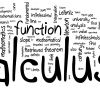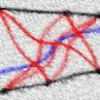 71
71I did, but it seems a bit fishy to me.
A = \lim_{n->\infty}\prod_{r=1}^{\infty }{(1+\frac{r}{n^{2}})}
ln A = \lim_{n->\infty}\sum_{r=1}^{\infty }{ln(1+\frac{r}{n^{2}})}
Now the limit on right side on evaluation gives 1/2.
So, A = \sqrt{e}
I'm not experienced at Latex so couldn't write it full.
 21
21that's it but the evaluation of limit on the right side is the main part, which i think, is not too trivial.. i m not saying hard though..i mean it deserves some comment
 71
71I thought you might have solved it using sets or whatever those things which always go above my head :-)
 21
21Yes.. I have a beautiful proof of it by IDK method... of course it's trivial by OMG.Don't ask me about these methods, its top secret and will be written in my gravestone...
Jokes apart
Just saw this one on mathlinks today
It's a calculus question...by mistake its here... in algebra...
I saw the solution, before trying it...